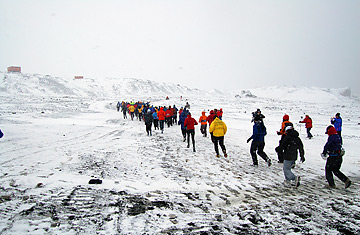
Runners take part in "The Last Marathon", a 26.2-mile race across ice, rock, snow and mud on Antarcticas King George Island.
Back in 1995, when the first Antarctica Marathon was run, there was no Lonely Planet guide to the continent. But over the past decade, tourism to the region has trebled, according to the International Association of Antarctic Tour Operators. The marathoners aren't the only adventurous souls holidaying in the Antarctic summer. A geophysicist who leads a tour at Vernadsky, a Ukrainian station visited by the runners two days after their race, says his base receives a ship just about every day this time of year. Data from this research outpost (operated, at the time, by the British) helped scientists discover the hole in the ozone layer. Today, Vernadsky also boasts the planet's southernmost souvenir shop, a postcard service, and a well-stocked bar with a billiards table and some thumping Ricky Martin. And why not? How many chances does a person get to buy a drink on every continent?
The Antarctic travel boom is due, in part, to improved technology that makes the region less remote. On race day, event sponsor Capella University, an online college based in Minnesota, beams back live video footage via satellite. But another reason is less tangible. There is, it seems, a growing romance with the untouched continent, the site of many — if not most — of the world's last truly pristine landscapes. International treaties preserve Antarctica for scientific research and tourism. And, unlike the Arctic, the Antarctic has yet to see many drastic effects of climate change. Visitors can still see cliffs of ice and the brilliant light blue of icebergs. They can see humpback whales and leopard seals cruise alongside their Zodiacs, or watch penguins chasing each other along the shore and pecking at visitors' boots.
Simply put, there's much to capture the imagination.
"For us, it was March of the Penguins," says Thom Gilligan, president of Boston-based Marathon Tours & Travel, which organizes the Antarctica Marathon. After the film's release, race entries shot up. The 2007 event sold out in 2005. Now the marathon, which was previously held every two years, is annual. Already the 2008 race is sold out and 2009 is half booked.
That doesn't make it easier to plan a marathon in Antarctica, though. Seventy-five miles off the Antarctic Peninsula, King George Island is one of the most accessible, hospitable points on the continental shelf. But the site is still a two-day sea voyage from the world's southernmost city, Ushuaia in Tierra del Fuego. Tourism regulations prohibit more than 100 people from gathering in the same place at the same time, so the race start must be staggered. And weather and course conditions are always unpredictable — as they are for all Antarctic expeditions. One year, in fact, the weather was so poor that runners didn't even get to the start line: The sea was too rough to allow a landing. They raced on the ship that had carried them south to Antarctica instead, running hundreds of laps on deck. But that's all part of Antarctica's appeal, says Gilligan, eyes gleaming. "I like the challenge, the unknown," he says. "It's certainly not boring." Nor, in the end, is it just about a long run in the cold. "You don't get many opportunities," says Gilligan, "to introduce people to things that'll change their lives and make them better custodians of the planet."
